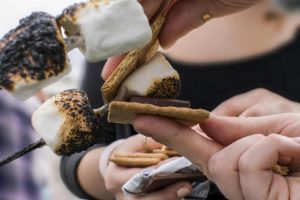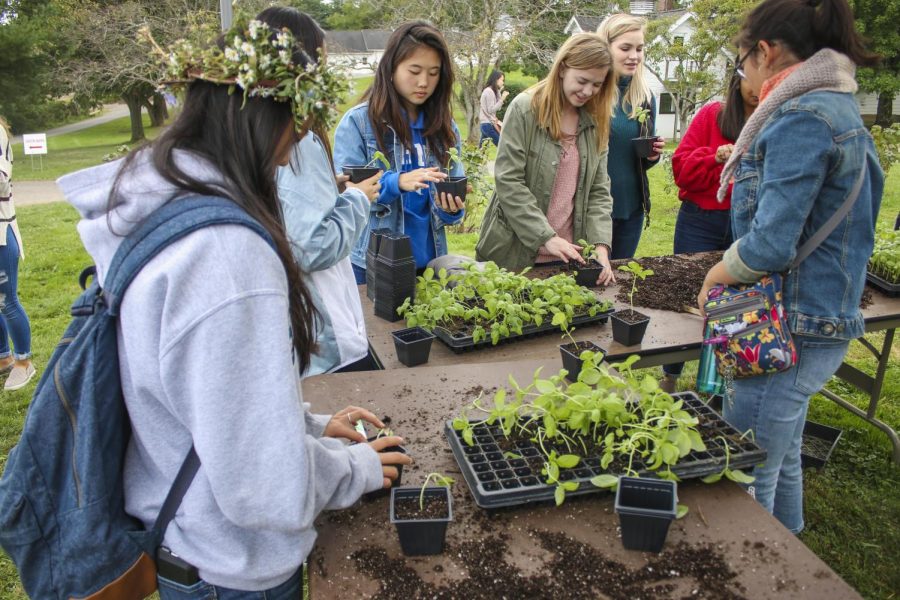Farm Harvest Festival welcomes new season
September 28, 2018
Saturday, Sept. 22 marked the Farm Administration and Student Sustainability Council’s (SSC) ninth annual Farm Harvest Festival. After over a year of organization by dedicated volunteers, the Farm Harvest brought crowds to the Case Western Reserve University Squire Valleevue Farm.
Many CWRU students, faculty and alumni chanced the 25-minute-long bus ride to the farm. Maia Gallagher, a third-year student and first time co-chair of SSC’s Farm Harvest subcommittee, hoped this year’s festival exceeded last year’s roughly 1,500 attendees.
However, Gallagher, who “joined SSC because of the Farm Harvest,” does not measure success merely by attendance.
“We want to educate people while having fun,” said Gallagher, describing a successful festival.
The results of the Farm Administration and SSC’s efforts are quite remarkable. Farm Harvest, a five hour affair, is always jam-packed with events and activities.
Centered around a one-story, white building a short walk from the farm’s greenhouse complex, Farm Harvest gave visitors an opportunity to explore the farm’s trails, dine on fall staples including apple cider and watch student groups perform among numerous other activities. The line for Mitchell’s Ice Cream quickly snaked outside of the tent where it was being served, and the petting zoo proved to be a fan favorite.
Farm Director Ana Locci offered another important aspect of a successful Farm Harvest: giving students a break from the hustle and bustle of busy campus life.
Farm Harvest is the biggest event Locci and the Farm Administration organize in collaboration with students and is also a personal favorite of Locci. She characterized the relationship between SSC and the Farm Administration as symbiotic.
“We couldn’t do [the Farm Harvest] without [SSC] and they couldn’t do it without us,” said Locci. “It really is a partnership.”
Besides a s’more station, deemed too popular to remove, Farm Harvest is a zero-waste event; every cup, plate and bowl issued by volunteers was composted. SSC and the Farm Administration plan on making Farm Harvest completely zero-waste, but s’mores will remain a staple until an alternative is found. 
Aside from eliminating the s’mores, other plans to expand Farm Harvest are in the works, especially since next year marks the festival’s 10-year anniversary. Expansion is a possibility due to the large number of student volunteers. Last year, there were almost 100 volunteers present at the festival.
According to Gallagher, “We are always trying to involve more of the campus and more student groups.”
Coincidentally, volunteering is one of the several ways Locci recommends undergraduates utilize the farm. Locci urges students to take advantage of classes held at the farm, research opportunities, full-time work during select stretches of the year and outdoor recreation.
“The mission of the farm is basically to complement the academic and recreational aspects of CWRU,” said Locci.
Students can take advantage of the farm at any time during their span at CWRU. One of the many benefits of Farm Harvest is the publicity it gives the farm. For many students, Farm Harvest provides their first opportunity to experience the farm. First-year student Makayla Shreve was one student who had never visited the farm prior to the festival.
Attending to support her friends performing with the Bhangra Team, Shreve found the atmosphere of the festival to be “very laid back and relaxed,” and “a nice break from campus and all the buildings.”
Among the many compliments Shreve levied upon Farm Harvest, she added, “[It was] the first time I have not been stressing about homework and exams,” which was perhaps the greatest.
Shreve’s sentiments encapsulate one of the important goals of the Farm Harvest and the reason many students came together to enjoy the great outdoors on the ideal first fall morning of new the season.



